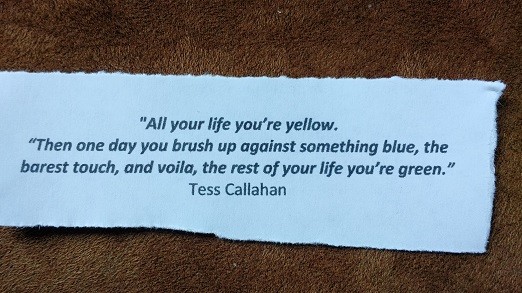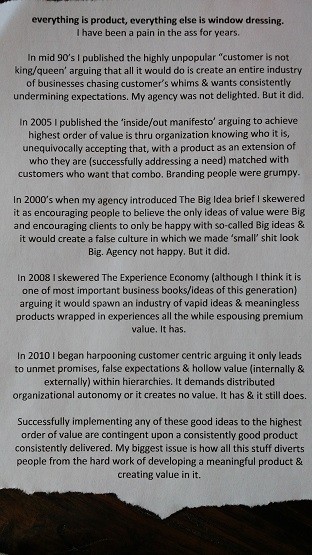reminiscing over functional value

=======
“In which the links of coincidence are forged into the chain of fate.”
Boris Akunin
==
Functional benefits.
Whites whiter.
Clarity of connection (Sprint pin drop).
Indestructible luggage.
Faster download speed (Motorola broadband).
To be clear. This is different than simply being rational, with no emotion communication intent, nor is it about features, this is about communicating a functional benefit.

In the good old days, you could walk into P&G, Sprint, Continental Baking (Wonder Bread), Abbott Laboratories (Pedialyte/Ensure), Walmart, Burger King (have it your way), Nabisco, Coppertone, and you would immediately gather around their functional campfire and discuss how what they made met a need. Heck, even Starbucks knew a consistent functionally good cup of coffee was at the core of their value and the Keebler elves were grounded in their baking abilities. In fact. Throughout the hallowed halls of business, you got bludgeoned with facts. Crisco layered on pans better which meant having to use less oil and fry better. Clear Eyes actually reduced red eyes better than Visine (but Visine purposefully had an ingredient to make eyes sting so people felt like it was working). Let me just say I wandered through more manufacturing plants, ruined more shoes walking through shrimp factories, grain warehouses, oil refineries than my salary probably could afford. Valvoline could spend hours discussing how their oil didn’t breakdown at high speeds in hot weather and efficiently flowed at coldest temperatures. You’d be bludgeoned with natural ingredients, patented molecules, some manufacturing wizardry and every functional differentiation under the sun. 99% of the time it was dancing on the head of a pin and, yet, 99% of the time it was the functional reason why you believed it was actually worth a shit. It wasn’t about Purpose, or vision, or even experience, the shit worked effectively (or with efficacy).
In those days you had to ratchet up discussions to nudge them into emotional connection space and vivid metaphors which could create visceral responses from buyers. We didn’t talk about ‘branding’ we talked about communicating value and meeting a need. And that’s what everyone felt the brand stood for. Not some fluffy document saying it would save the world. It was a product, or service, that would save the moment for that particular user. It worked. And functionally we tried to hammer home why it worked so well. And people actually trusted the products, services, because they knew (kind of) how it worked. That didn’t mean we bashed people over the head with rational reasons to buy – more often we leveraged the key functional attribute supporting the functional benefit and, well, communicated its effectiveness.
Now. Functional may appear to meet some generic needs but, practically speaking, the best of the best creates visceral value at the intersection of want AND need. In my mind functional is always the brand/product/service core strength, it is what keeps everything grounded in the ‘need universe’ which ultimately is what protects the business from fads, time and the whims of Life. Some people disagree with me <see footnote to see my thought on “Experience”>. That said. While everyone is tempted to do a little of everything, getting tugged between rational and emotional and aspirational, the product managers <there weren’t brand managers then> of old, despite much flawed thinking, hunkered down on insuring whatever products/services they offered had a rational, functional, benefit to be at the core of whatever it was they want to market and sell. We may debate their ultimate emphasis, but I’d debate anyone who would suggest they didn’t understand the day-in, day-out functionally distinct benefit they offered.

And then something went awry. Personally, I think everyone started smoking the branding crack pipe forgetting about functional reasons for being and convinced themselves perception was reality and we could make people think anything we wanted them to think about our product or service (whether it was real or not). This was the magic of ’branding.’ The problem is it is simply a sleight of hand.
But let me get back to the topic at hand: functional, rational and benefits.
Functional benefits discussions usually start off well. More often than not conversations begin with ‘what makes us different/distinct that our product/service does.’ In other words, good solid practical meaningful “Hey. I got something that can actually provide some value to someone.”
It then usually ends up not so well. More often than not it ends with some version of “here is what we need to say <about us and ‘it’>.” Let me be clear. That is important. It has to be. Ultimately you need to say something to people to distinguish your space in people’s minds and inevitably make a sale or create some engagement/purchase. You have to offer some practical value to match the dollars forked over. But far far too often the conversation gets dragged down into the sinkhole of practicality. And this seems to happen far far too quickly <like right at the beginning>. It is like everyone gets stuck on the rational mind aspects. And, frankly, it is a pretty easy place to get stuck. Rational is rational and when it comes to ‘wallet type’ discussions even some fairly experienced behavioral thinking business people get sucked into this black hole of practicality. And, yet, even as this black hole seems to start sucking the entire galaxy of collective thinking in the room, in the back of everyone’s mind they know that if somehow, someway they could connect their business proposition to a potential buyer’s heart, not just their mind, it is better for the business <they may not be able to articulate the exact whys of why it is better, but most business people know in their gut that a ‘heart connection’ is meaningful>.
But this is almost exactly where this whole slippery slope of mediocrity and practicality discussion seems to veer off into the absurdity which actually encourages business people to sit in the “practical zone.”
The next often incredibly absurd conversation, as everyone ponders how the business can reach into people’s hearts and not just their minds, relates to ‘emotional connection.’ As in “we need to get people emotionally engaged if we want to differentiate in the long term.” This is business people’s version of James’ “win the heart and the mind will follow.” Absurdly, from that point on the conversations inevitably get steered into some practical discussion of how to get people emotionally involved <as if we could pragmatically convince someone to be emotionally involved>.
That looks crazy even as I write it.
Yes. Practicality and rational has a role. In fact, its role is essential to the greater need. The rational enables the “heart” possibilities. But. It is the ‘heart’ aspects which shift success from “we sell something” to “people want our something.” Yet. Most business people are pretty rationale so they approach emotional connection, uhm, rationally. Words come out of some sage manager like “what can we do to create this emotional connection?” I always want to lean forward and say “well, remember that girl in high school you liked and decided you were going to get her to like you? … how did that work out for you?” You cannot actively pursue getting someone to like you. You cannot actively, rationally, build an ‘emotional connection.’ You can truly only control you, your business, your product, your organizational culture and the character which embodies all of that. Once you believe in that and it is truth <and not something some sage flunkie has crafted to be in some poster that appears in the cafeteria> you are on your way to, well, start dating potential users & buyers.

“You cannot use someone else’s fire; you can only use your own. And in order to do that, you must first be willing to believe you have it. “
Audre Lorde
In the end.
You gotta discuss all three core components:
– aspirational keeps the horizon in perspective,
– emotional insures you stay true to thineself,
– rational insures you keep everyone’s eye on the ‘how we make our money’ ball.
Ponder.
- ** footnote on the ‘experience black hole’:
Once again, there is some value in thinking about value based on function and a consistent functional delivery. I thought of this the other day as I endured another “people value experience” discussion. As I have stated a variety of times, to Joe Pine in fact, The Experience Economy was the best, and worst, book to be read by the business world. The best in that it articulated the hierarchy of value in a way so that business people could see how value could be earned (and expanded) experientially not just functionally. The worst in that all of a sudden it spawned a tribe of hollow products/brands (truly commodity or slightly less) which created the perception of value THROUGH experience. It created almost an either/or business world. Needless to say, there are entire herds of marketing and brand people seeking to create value off of experience while treating their product as if it’s a commodity. What that means is the value shifts away from the product itself (basically it, itself, becomes a lowest price widget) and the value, and any premium in the price you charge, is found in “the experience.” Well. Read that closely because that explains a shitload about why marketing is IN a shithole. I am not suggesting experience isn’t valuable or it shouldn’t have some value, but not being able to leverage even a sliver of a differentiation in your product means it is basically the same as everyone else’s and, well, you may as well buy it off the commodity market than invest in any proprietary manufacturing.



Leave a Comment